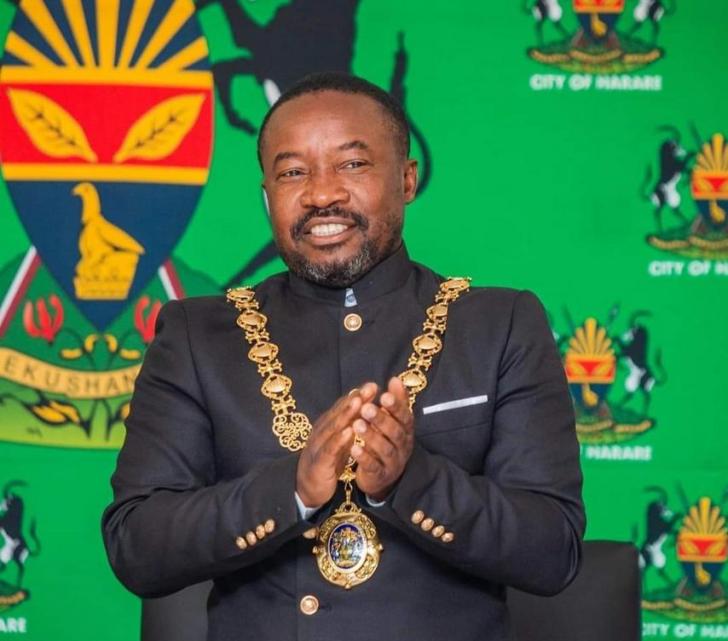News / National
Mafume's praise for Mnangagwa sparks controversy
3 hrs ago | Views

Harare Mayor Jacob Mafume has caused a stir in Zimbabwean political circles after he publicly lauded President Emmerson Mnangagwa and his Zanu-PF government for their contributions to improving service delivery in the capital.
Mafume, who serves as a councillor for the opposition Citizens Coalition for Change (CCC), credited Mnangagwa's administration for progress made in Harare, particularly in infrastructure development, despite the longstanding opposition criticism of government interference in local governance. His remarks came during the Zimbabwe Local Government Association (ZLGA) Annual Indaba, held in Harare last week, which saw attendance from over 2,000 councillors from across the country.
Mafume's comments have raised eyebrows, especially considering his role in the opposition party, which has historically been at odds with Mnangagwa's government. Speaking at the event, the mayor acknowledged the government's role in supporting the city's development, expressing regret for initially opposing the controversial Geo Pomona waste management project.
"I was misdirected by rejecting the Geo Pomona project. Now, I can see that it is actually benefiting the city," Mafume admitted. "We must all be thankful for the guidance that we have received from the President."
This sudden shift in tone has sparked widespread debate, with political observers suggesting that Mafume's praise for the ruling party signals a weakening of opposition influence in Zimbabwean politics.
Mafume continued by defending the administration's efforts in achieving Harare's Vision 2025 goal, emphasizing that significant improvements were already visible. He cited infrastructure projects like the world-class Robert Mugabe International Airport, the new Parliament Building in Mt Hampden, and the development of major roads, including the Mbudzi interchange. He argued that such projects align with the city's vision of becoming a world-class destination.
"If someone woke up in 2024 after having died, they would be surprised to find a world-class airport in Harare, a world-class Parliament in Mt Hampden, and major roads connecting our city," Mafume said. "Government has done a lot to help fulfill this vision, and now it is up to us as councils to complement that by addressing service delivery issues like waste collection."
Mafume's praise for the government has left many wondering about the future of opposition politics in Harare and beyond. His election as mayor for a second term was met with internal opposition from within the CCC, particularly after the recall of former mayor Ian Makone.
While Mafume's comments may reflect a pragmatic approach to city governance, they also suggest a shift in political dynamics, with the ruling party appearing to gain more influence at the local government level.
Critics have accused the mayor of compromising his position, saying that his newfound alignment with Zanu-PF could signal a lack of independence within opposition-run councils. Some political analysts view the praise as a sign of diminishing opposition resistance to the ruling government's influence on local affairs.
As Harare moves forward with ambitious infrastructure projects and service delivery reforms, the question remains whether this marks the beginning of a new era of cooperation between opposition-led councils and the Zanu-PF government or a further erosion of the opposition's political standing.
Mafume, who serves as a councillor for the opposition Citizens Coalition for Change (CCC), credited Mnangagwa's administration for progress made in Harare, particularly in infrastructure development, despite the longstanding opposition criticism of government interference in local governance. His remarks came during the Zimbabwe Local Government Association (ZLGA) Annual Indaba, held in Harare last week, which saw attendance from over 2,000 councillors from across the country.
Mafume's comments have raised eyebrows, especially considering his role in the opposition party, which has historically been at odds with Mnangagwa's government. Speaking at the event, the mayor acknowledged the government's role in supporting the city's development, expressing regret for initially opposing the controversial Geo Pomona waste management project.
"I was misdirected by rejecting the Geo Pomona project. Now, I can see that it is actually benefiting the city," Mafume admitted. "We must all be thankful for the guidance that we have received from the President."
This sudden shift in tone has sparked widespread debate, with political observers suggesting that Mafume's praise for the ruling party signals a weakening of opposition influence in Zimbabwean politics.
"If someone woke up in 2024 after having died, they would be surprised to find a world-class airport in Harare, a world-class Parliament in Mt Hampden, and major roads connecting our city," Mafume said. "Government has done a lot to help fulfill this vision, and now it is up to us as councils to complement that by addressing service delivery issues like waste collection."
Mafume's praise for the government has left many wondering about the future of opposition politics in Harare and beyond. His election as mayor for a second term was met with internal opposition from within the CCC, particularly after the recall of former mayor Ian Makone.
While Mafume's comments may reflect a pragmatic approach to city governance, they also suggest a shift in political dynamics, with the ruling party appearing to gain more influence at the local government level.
Critics have accused the mayor of compromising his position, saying that his newfound alignment with Zanu-PF could signal a lack of independence within opposition-run councils. Some political analysts view the praise as a sign of diminishing opposition resistance to the ruling government's influence on local affairs.
As Harare moves forward with ambitious infrastructure projects and service delivery reforms, the question remains whether this marks the beginning of a new era of cooperation between opposition-led councils and the Zanu-PF government or a further erosion of the opposition's political standing.
Source - newsday





































